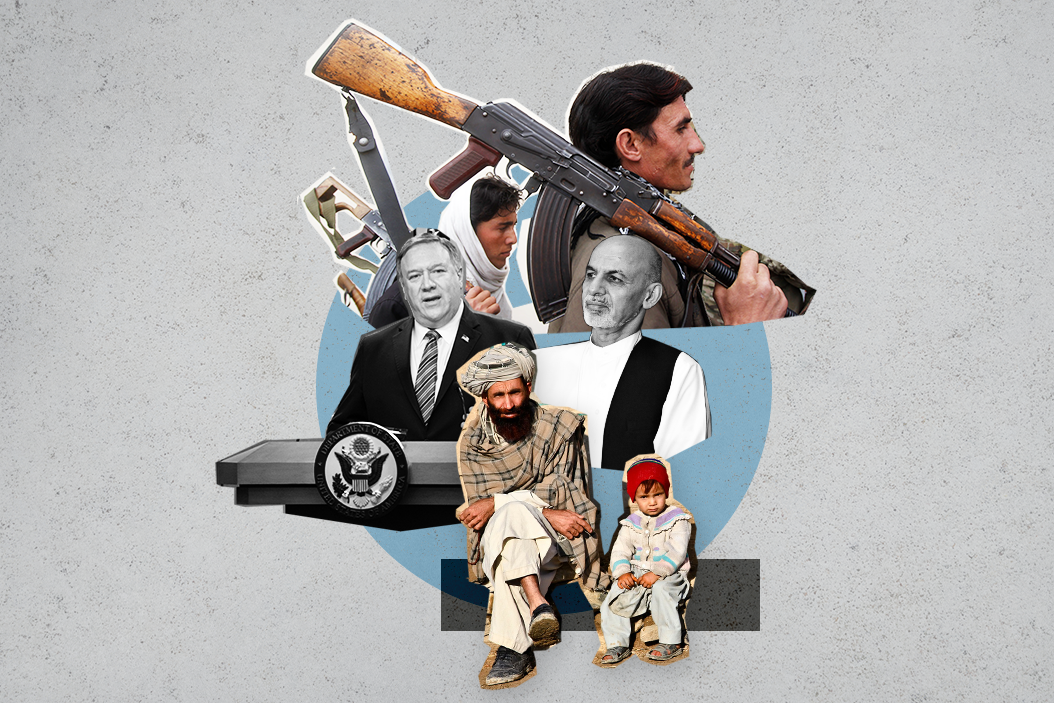It's the decision that could kickstart intra-Afghan dialogue, and pave the way to ending the US occupation in Afghanistan after 20 bloody years.
On Sunday, after days of deliberations that involved thousands of Afghan delegates packing into one tent (what's COVID again), President Ashraf Ghani agreed to release hundreds of Taliban prisoners from government jails. The move opens the way to intra-Afghan dialogue under a deal that the US brokered directly with the Taliban earlier this year.
The Trump administration has touted this development as a major step towards peace, but after nearly two decades of war, the relevant players are still miles apart when it comes to laying out a common vision for the conflict-ridden country. What do they all want?
The Afghan government: Power brokers in Kabul have articulated some guidelines for a way forward after decades of war: In exchange for disarmament and a commitment to anti-terrorism measure, the Taliban could remain a visible force in public life and compete in elections.
Some analysts have compared this vision to the 2016 deal reached between the Colombian government and FARC rebels after years of conflict.
Indeed, while President Ghani and other influence peddlers in Kabul support the system of electoral democracy that emerged in the wake of the 2001 US invasion, critics point to tribal divisions and endemic corruption as reasons for widespread lack of confidence in the current political system.
The Taliban: The militant group's vision for a post-settlement Afghanistan remains murky. Ambiguous commitments about ceasing its violent activities — and offering protection for women— have only engendered greater fear among the Afghan population and mistrust among the political elite.
To date, the group has done little to show its willingness to embrace meaningful compromise. It has, in fact, intensified its violent insurgency in recent months, waging attacks that killed at least 42 government forces and 41 civilians in the week leading up to August 6.
Crucially, while the Afghan government backs the political status quo, the Taliban wants to reimpose the Islamic Emirate brand (enforced when they ruled the country from 1996-2001) as a system of governance — essentially, a theocratic state ruled by extreme interpretations of Islamic law. How the two sides might reconcile these disparate world-views within the framework of a power-sharing agreement remains… unclear.
The US: For the Trump administration, any political progress in Afghanistan will make it easier to follow through on its promises to reduce the number of American troops in wars in far-flung places around the world. This mission, popular among a war-weary US public, has renewed urgency now that polls show his Democratic opponent Joe Biden running full steam ahead.
Presumably, that's part of the reason for the Pentagon's announcement this week that the number of American troops in Afghanistan would be cut to below 5,000 by the end of November, despite the fact that the atmosphere surrounding intra-Afghan negotiations, and prospects for reconciliation, remain bleak. (There are around 8,600 American troops still in Afghanistan.)
What do the Afghan people want? Undoubtedly, the Afghan people have borne the brunt of insurgent violence, weak government, and economic stagnation over the past few decades.
But a recent survey by the Afghan Institute for Strategic Studies found that 68 percent of respondents prefer the current political structure, however flawed, to Taliban rule.
Over 80 percent said they think the people should directly elect the country's leaders, while the same number of respondents also expressed support for liberalization, including greater emphasis on women's rights and freedom of expression — concepts at odds with the Taliban ethos. (Many Afghan women fear that gains made towards their integration into Afghan society over the past 18 years will disappear in a flash if the Taliban joins the government.)
For years, warlords and criminal networks have squandered foreign aid intended to stimulate businesses and jobs. In the country deemed the most dangerous place in the world to be a child, it's no surprise that most Afghans simply want to be freed from the destructive cycle of corruption and violence that has sapped the promise of Afghanistan's economy.
Is there any hope? Almost two decades after the US invasion of Afghanistan there is an opening for peace, but making real progress will rely on meeting the demands of all of these groups in a way that has so far proven disastrously elusive.
